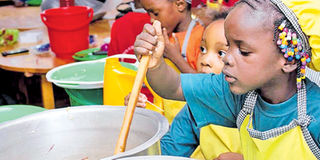Cooking teaches children much more

What you need to know:
This week, Young Citizen visited St Joseph Primary School located in Mbezi Africana, Dar es Salaam whereby Pre-unit pupils were being taught how to cook simple foods. Speaking to the Young Citizen, the pupils who were excited expressed their joy on what it feels like to learn how to cook.
Children learn better by doing or sometimes by just seeing things being done. When teachers train children how to cook in schools they are likely to promote lifetime skills and it offers an opportunity to communicate with them on a regular basis.
This week, Young Citizen visited St Joseph Primary School located in Mbezi Africana, Dar es Salaam whereby Pre-unit pupils were being taught how to cook simple foods. Speaking to the Young Citizen, the pupils who were excited expressed their joy on what it feels like to learn how to cook.
Dafroza Geodfrey, a Pre-unit pupil says she enjoys cooking spaghetti and sausages. “Every Friday we are taught how to prepare different meals. Today, we are learning how to prepare spaghetti and sausages. It is a wonderful experience,” says Dafroza, adding that she is eager to help her mother to prepare the meals at home. According to her, they earn life time skills through practicing counting, measuring and tracking time and also learn how to communicate while in the kitchen.
She says teachers teach them how to cook different food stuff and thereafter they eat together whatever has been prepared during the cooking lesson. Jackline Fredrick, also a Pre-Unit pupil says she enjoys cooking and her favorite food is chips. She explains how to prepare chips.
“First I peel the potatoes and cut them into pieces then I rinse them well, drain the water, after that put the potatoes into a pan then I turn on the heat,” Cate Florence says spending time in the kitchen gives her confidence, adding that she feels responsible to prepare meals for the family. However,their teacher Ms Fiona Mzambaka, says, teaching young children how to cook gives them lifelong skills because it is an opportunity to impart nutrition education, including planning meals and make smarter food choices and inculcating in children a culture of washing hands before they start cooking.
She explains that young children really like cooking that is why it forms a major part of their play as they immitate what they see in their kitchens. “That is why I make sure I teach them well because some of them may become talented cooks and you never know when they grow up they could opt to become business people, who own catering projects or become reputable chefs,” she says.
She says that children are much more likely to eat what they make. “Is there anything more fun than eating your art?” she asks.




